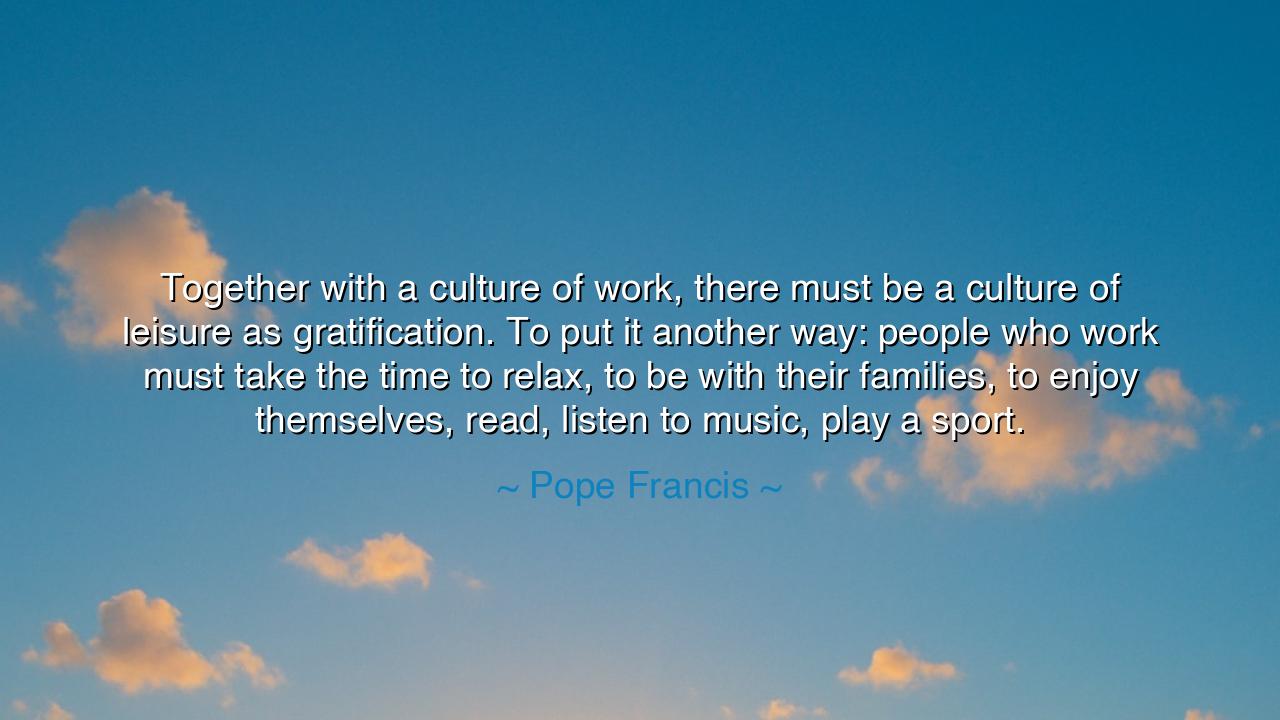
Together with a culture of work, there must be a culture of
Together with a culture of work, there must be a culture of leisure as gratification. To put it another way: people who work must take the time to relax, to be with their families, to enjoy themselves, read, listen to music, play a sport.






Hear, O children of toil and striving, the voice of Pope Francis, who in his wisdom declared: “Together with a culture of work, there must be a culture of leisure as gratification. To put it another way: people who work must take the time to relax, to be with their families, to enjoy themselves, read, listen to music, play a sport.” These words carry the weight of ancient wisdom dressed in modern simplicity. They speak to the balance of life, to the sacred rhythm of effort and rest, of duty and joy. For man is not made to be a beast of burden, nor a creature of idleness, but a being of harmony, whose strength is nourished by both labor and leisure.
The first truth lies in the call for a culture of work. Work is holy when done with purpose, when it builds, creates, sustains. It brings bread to the table, dignity to the heart, and structure to society. Without work, the human spirit grows idle and withers in neglect. But work alone, without its counterbalance, becomes tyranny. The plow that never rests breaks, and the hand that never releases its grip loses its strength. Pope Francis, like sages before him, saw that work must be paired with leisure, for only then is life made whole.
Thus he speaks of a culture of leisure as gratification. Leisure here is not waste, nor is it sloth. It is the sacred time when man restores his soul, when he delights in the gifts of life beyond labor. To be with family, to laugh with friends, to read words that nourish the mind, to listen to music that soothes the heart, to play a sport that strengthens the body—these are not luxuries, but necessities. For in leisure, the soul drinks deeply of joy, and joy gives strength to return to the labors of tomorrow.
Consider the ancients of Rome, who built aqueducts, roads, and empires. They were masters of labor, yet they also revered the baths, the theaters, the games. They understood that leisure was not opposed to work but a companion to it. And though their empire eventually crumbled through excess, the lesson remains: that a people flourishes when work and leisure are held in balance, and perishes when either consumes the whole.
Think also of the tale of Florence Nightingale, the Lady with the Lamp. She worked tirelessly, tending to soldiers through the long nights of war. Yet even she, in her private hours, turned to literature, to prayer, to moments of peace. Her leisure was not abandonment of duty—it was the wellspring that gave her the strength to serve again. Without those moments of restoration, her flame would have dimmed long before her mission was complete.
The lesson for us is clear: balance is the secret of endurance. Do not glorify unbroken toil, nor idolize endless rest. Instead, weave them together as the warp and weft of life’s fabric. Work with vigor, but also feast, rejoice, and replenish. For in laughter with family, in a song well sung, in the quiet turning of a page, you are not wasting time—you are gathering strength, wisdom, and love.
Practical wisdom follows: each day, mark time for rest as faithfully as you mark time for work. Set aside hours for your family, for reading, for music, for play. Do not apologize for this, for it is not laziness—it is obedience to the deeper law of life. In this way, your work will not consume you, but will be sustained by the joy that leisure brings. And your leisure will not weaken you, but will prepare you to return to your duties with a heart renewed.
Thus, remember the teaching of Pope Francis: “Together with a culture of work, there must be a culture of leisure as gratification.” Let it be your guide, so that your life does not become an endless chain of tasks, but a song of harmony, where labor and joy dance together. For only in this balance will you find strength, peace, and the fullness of being human.






AAdministratorAdministrator
Welcome, honored guests. Please leave a comment, we will respond soon